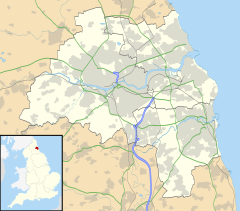Washington New Town
| Washington | |
|---|---|
 A view over Washington from Penshaw Monument |
|
| Washington shown within Tyne and Wear | |
| Population | 67,085 |
| OS grid reference | NZ3157 |
| Metropolitan borough | |
| Metropolitan county | |
| Region | |
| Country | England |
| Sovereign state | United Kingdom |
| Post town | WASHINGTON |
| Postcode district | NE37, NE38 |
| Dialling code | 0191 |
| Police | Northumbria |
| Fire | Tyne and Wear |
| Ambulance | North East |
| EU Parliament | North East England |
| UK Parliament | |
Washington is a large new town in the City of Sunderland local government district of Tyne and Wear, England, and part of historic County Durham. Washington is located geographically at an equal distance from the centres of Newcastle, Durham and Sunderland, hence it has close ties to all three cities.
Washington was designated a new town in 1964; it expanded dramatically, by the creation of new villages and the absorption of areas of Chester-le-Street, to house overspill population from surrounding cities.
At the 2011 census, Washington had a population of 67,085, compared to 53,388 in 2001.
Early references appear around 1096 in Old English as Wasindone. The etymological origin is disputed and there are several proposed theories for how the name "Washington" came about. Early interpretations included Wasindone (people of the hill by the stream, 1096), or Wassyngtona (settlement of Wassa's people, 1183).
The origins of the name Washington are not fully known. The most supported theory (especially amongst local historians) is that Washington is derived from Anglo-Saxon Hwæsingatūn, which roughly means "estate of the descendents (family) of Hwæsa". Hwæsa (usually rendered Wassa or Wossa in modern English) is an Old English name meaning "wheat sheaf", the Swedish House of Vasa being a more famous cognate.
Due to the evolution of English grammar, modern English lacks the Germanic grammatical features that permeated Anglo-Saxon English. This adds an air of confusion for most in regards to the name Hwæsingatūn. It is essentially composed of three main (albeit grammatically altered) elements:
...
Wikipedia

